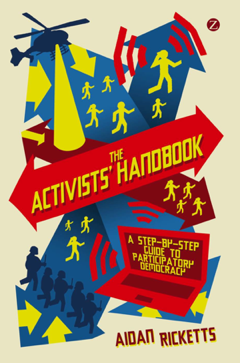- Home
- Commentary
- Navigating disinformation, uncertainty, individualism and the poison apple of conspiracy
- If nothing changes nothing will change: the Voice referendum
- What can we learn from disaster communities?
- New year, a time to embrace the uncertainty of it all
- We could be non-binary
- Adaptive resilience vs safety paternalism
- Left wing, right wing? What just happened to politics?
- Covid, class and the addiction to certainty
- Neoliberalism, the Life World and the Psychopathic Corporation
- Democracy is about our bodies, not just our minds
- What’s your motivation: is it yourself or the change you’re making?
- Mind over matter: The world of abstraction is driving us to destruction
- The real threats to our liberty and survival
- Avoiding the abyss of conspiracy theories
- The difference between a legal system and a fantasy novel
- What’s a conspiracy and what’s just common garden variety corruption?
- Unpredictability, humility and an emerging anthropandemic
- The trilemma – climate change, economic collapse, and rising fascism
- Happy New Normal for the decade ahead
- Fires, liars and climate deniers
- The race to the bottom in australian politics
- Talking about lock-on devices – an article in ‘The Conversation’
- The Ponzi scheme is teetering
- Regenerative culture a key part of the blockade experience
- Staying sane in the late Anthropocene
- Extinction Rebellion
- Major parties have failed on climate, it’s time to rebel.
- Elections In The Late Anthropocene
- It is the Greens that are defeating the Nats and it’s all about your preferences
- Australia’s powerhouse of democracy and innovation is in the Northern Rivers
- Is identity politics a problem for the left?
- The climate emergency and the awful state of Australian politics
- Democracy and rights under threat in corporate police state
- Liberty, freedom and civil rights? Do any of us understand these things anymore.
- The forest wars are back, time to mobilise
- …more commentary
- Workshops
- News & Events
- Media
- A Flood of Emotions – Sydney Ideas Event
- Participatory democracy in the COVID era – SCU podcast
- Activism educator Aidan Ricketts explains how and why protests can be peaceful
- Bob Brown Is Taking “Shocking” Anti-Protest Laws To The High Court
- Anti protest laws could arrest nannas, seize tractors
- “They blinked first”
- Colin Barnett quick to protest against ‘activism degrees’ – The Australian, 16/10/2014
- ‘Degrees in activism’ put brake on growth – The Australian, 15/10/2014
- Magistrate throws out vexatious police case against CSG protesters
- Outrage over school PR ‘by stealth’- The Northern Star
- CSG clash a certainty
- Communities use new tactics
- Gas group attacks lecturer
- …more media
- Activist Resources
- Reviews
Recent Posts
- Navigating disinformation, uncertainty, individualism and the poison apple of conspiracy
- If nothing changes nothing will change: the Voice referendum
- What can we learn from disaster communities?
- New year, a time to embrace the uncertainty of it all
- We could be non-binary about a lot more than gender
I like these sites
Community Organisations
- Code Green Tasmania
- CSG Free Northern Rivers
- Friends of the Earth Melbourne
- Generation Alpha
- Huon Valley Environment Centre
- Lock the Gate Alliance
- Nature Conservation Council NSW
- North Coast Environment Council
- North East Forest Alliance
- Plan to Win
- Rainforest Information Centre
- Save our Foreshore
- Still Wild Still Threatened
- The Change Agency
- The Wilderness Society








Preference whispering or vote scamming?
Our Senate voting system is based on proportional representation which aims to provide representation in rough proportion to the votes a party receives. Add in preferential voting and you get a complex system in which the lowest scoring candidates are eliminated and their preferences distributed back up the line until 10 senators are elected. So far so good.
Unfortunately under the current system voters do not get to direct their preferences above the line like they do in the NSW Upper House, instead the parties themselves get to register a preference ticket that determines where their preferences go. Giving parties control over preferences has proven too much of a temptation for the unscrupulous. The darkest most secretive day of Australian politics happens as the deadline for registering party preference tickets approaches. Negotiations, double crossing and unholy alliances abound as the parties jostle for smart (or sleazy) preference deals.
A symptom of the current malaise is the proliferation of fly-by-night micro parties each election with noble or innocuous sounding names. Voting for a Senate party on the basis of its name alone is like blind dating on the internet. Some are genuine, others may be just a vote harvesting front. The genuine party’s preferences will reflect their stated values, but when you see the unholy alliances appearing between parties with nothing in common, you know someone must be trying to game it.
The federal parliament is looking at reforms to stop the gaming of the vote, but of course we need to be careful it doesn’t become a closed shop for the big parties either. Some sensible suggestions so far include above the line preferencing just like in the NSW Upper House, or setting a low primary vote threshold so parties at least need say 5% of the primary vote to be eligible to win a Senate seat. Hard choices… but it’s clearly bad for democracy to have micro parties gaming the vote, so we need to make the system more transparent. Voters, not parties should decide where their Senate preferences go.
This article was originally published in the Northern Rivers Echo on 21 May, 2015.